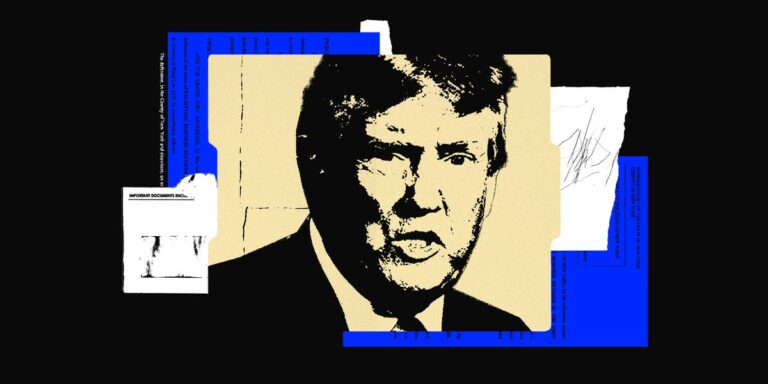- Donald Trump’s criminal case for holding classified documents has been dropped.
- The judge ruled that the appointment of Jack Smith as special prosecutor was unconstitutional.
- The decision will almost certainly be appealed and may go all the way to the Supreme Court.
The federal judge overseeing former President Trump’s criminal case for hoarding classified documents at Mar-a-Lago has dismissed the charges against him.
U.S. District Court Judge Aileen Cannon, who was appointed by Trump when he was president, ruled Monday that the Justice Department’s appointment of Special Counsel Jack Smith, who oversaw the prosecution, was unconstitutional.
The case is widely considered the easiest of the four criminal cases against Trump. Smith alleges that Trump took documents containing government secrets when he left the White House in January 2021, and stored many of them at his Mar-a-Lago club, where he lives.
Trump then repeatedly obstructed federal agencies trying to recover the documents, and directed his employees to lie and mislead federal investigators, prosecutors allege — leading to the FBI’s dramatic raid on Mar-a-Lago in 2022.
Cannon’s 93-page ruling Monday did not question those events. Instead, the Florida judge ruled that Smith’s appointment violated the U.S. Constitution’s appointment clause.
The role of Special Counsel is defined by Justice Department regulations. However, someone with such legal authority would need to be authorized by Congress, he wrote.
The only way to fix this, Cannon wrote, is to drop the charges against Trump.
“For more than 18 months, Special Counsel Smith’s investigation and prosecution have been funded by massive funds taken from the Treasury Department without legal authorization, and any attempt to rewrite history at this point seems nearly impossible,” Cannon wrote.
On Truth Social, Trump — who is recovering from injuries after he was shot in the ear by a would-be assassin on Saturday — wrote that all four criminal cases against him should be dropped, along with E. Jean Carroll’s sexual assault and defamation charges against him.
“As we move forward in uniting our nation after the horrific events of Saturday, the dismissal of these Unlawful Indictments in Florida should be only the first step, followed immediately by the rejection of ALL Witch Hunts,” he wrote.
Trump has claimed without evidence that the cases were coordinated by the Justice Department and are political in nature, even though the Manhattan and Georgia indictments were brought by local prosecutors, and a jury found Trump liable for sexual harassment of Carroll and defamation of her in a civil trial.
Cannon’s decision Monday will almost certainly be appealed to the 11th Circuit Court of Appeals and, after that, could be taken up by the U.S. Supreme Court.
The legality of Justice Department special counsels has been a matter of debate for the past two decades. The law that provided for so-called independent counsels during Ronald Reagan’s Iran-Contra affair and Bill Clinton’s Whitewater controversy expired in 1999. Since then, the U.S. attorney general has appointed special counsels with less authority while relying on internal Justice Department regulations.
Defense attorneys in the special counsel investigations have routinely argued that the appointment of new special counsels is unconstitutional. Special counsels can convene grand juries and file indictments in any district in the country, effectively making them “Officers of the United States” as defined by the Constitution’s Appointments Clause who must be funded and authorized by Congress, they say. The Justice Department argues that the arrangement is permissible because special counsels are appointed and overseen by the attorney general, who does have that authority.
In his ruling, Cannon criticized the executive branch in general, writing that federal agencies should generally be careful about appointing special counsels based on their own internal regulations.
“Ultimately, it appears that the Executive’s increasing comfort in appointing ‘regulatory’ special advisers in recent times has followed an ad hoc pattern with little judicial oversight,” he wrote.
When the U.S. Supreme Court heard arguments on presidential immunity earlier this year, some legal groups and Trump allies urged the court to consider the special counsel as well.
The Supreme Court ultimately did not hear arguments on the issue — despite finding broad presidential immunity powers in criminal cases — but Justice Clarence Thomas wrote in a concurring opinion that it would find many types of special counsels unconstitutional.
None of the other eight justices agreed with Thomas’ opinion. And lower courts have routinely upheld the legality of special counsels in cases involving Robert Mueller and others.
Cannon’s decision could be good news for Hunter Biden, who was convicted of gun-related crimes last month in a case brought by Special Counsel David Weiss. His attorneys have indicated that, in an appeal, they will challenge the legality of the special counsel’s appointment in the first place.
This news is developing and will be updated.


